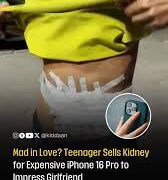A viral video circulating on social media has ignited a firestorm of concern and disbelief after a teenage boy claimed he sold one of his kidneys to buy an iPhone 16 Pro Max for his girlfriend. While it remains unclear whether the video is a real confession or an elaborate prank, the message behind it has struck a chord with viewers worldwide: no relationship, gadget, or social media trend is worth sacrificing your health or future.
In the video, the teen appears visibly proud of his decision, stating that the iPhone was a “proof of love” for his partner. He goes on to say that the admiration he’s receiving online makes it “worth it.” The clip, which quickly gained millions of views, has sparked a wave of comments ranging from disbelief and humor to genuine concern and criticism.

Medical professionals and social commentators have been quick to respond. “Whether this is real or staged, it’s deeply troubling that such an idea is even considered entertaining,” said Dr. Priya Nair, a nephrologist based in Mumbai. 16 Pro
“Selling a kidney is illegal in most countries and can have lifelong health consequences. We should be educating our youth on valuing their well-being over material possessions.”
This isn’t the first time such a story has made headlines. In 2011, a Chinese teenager famously sold a kidney to buy an iPad and iPhone — a decision that led to severe health complications and eventual disability. That real-life tragedy is often referenced as a cautionary tale against the extremes some might go to for consumer goods or social status.
Digital culture analysts say the video reflects a disturbing trend: the rise of shock content designed purely to go viral. “Teenagers are increasingly under pressure to perform for online clout,” says media psychologist Dr. Samuel Clarke. “When views and likes become a currency, even the most extreme ideas start to look like viable options.”
Regardless of whether the video is real or a hoax, the core message remains vital: Protecting your body and future should always come before fleeting trends, gifts, or digital fame.
As the video continues to make rounds on TikTok, Instagram, and X (formerly Twitter), health experts, educators, and parents alike are urging teens to think twice before falling for sensational content — or worse, trying to recreate it.
The bottom line? No phone, no trend, and certainly no relationship is worth losing a part of yourself — literally or figuratively.















 Categories
Categories










